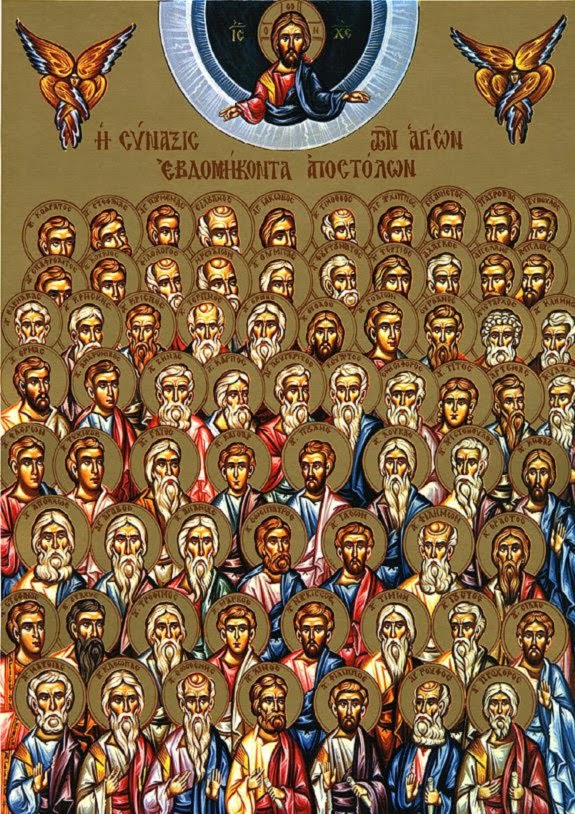Moses Elects the Council of Seventy Elders (1737) by Jacob de Wit (1695-1754)
"And spoke the Lord to Moses: 'Gather to me seventy men from the presbyters of Israel, whom you know, that they are presbyters of the people and scribes of them.'"--Num 11:16
Those God chooses to lead His people are never alone in their task. The Lord does not wish it to be so. Instead, the Lord calls others to support them in their ministry. Take the example of Moses. Not only did he have his brother Aaron at his right hand, but he had elders, presbyters (as the Greek has it), who assisted him. At the exhortation of his father-in-law, Jethro, he called righteous men from the tribes of Israel to be rulers over the people and to assist him in judging. These were not his only assistance, though, for the Lord ordered Moses to bring seventy presbyters of Israel to be before Him on the holy mountain. These are the ones who "were seen in the place of God and ate and drank." Truly God wished these men to assist His servant Moses, for He allowed them to be before His Face and yet live.
We see seventy presbyters again in the Book of Numbers. Again God directs Moses to gather the presbyters, for this time He declares, "I will take from the spirit which is upon you and place it upon them," that they could bear the burden of the people with him. So Moses was not alone in guiding the people of God, for the presbyters assisted him. These presbyters, these elders, were respected among the people, and thus they could guide them well. Is not seventy a fitting choice of number, also, for it combines two of the great Christian numbers, three and seven? (For it is three plus seven then multiplied by seven.)
Of course, even such a significant number of men are not always allied to the Lord, especially when so much of Israel began to fall away. So Ezekiel saw "seventy men from the presbyters of the house of Israel" offering incense to the abomination in the sanctuary. Yet while these seventy were blaspheming idolaters, centuries later the Lord rose up seventy presbyters who were lovers of His Word. These are the seventy gathered in Alexandria to translate the Scriptures into the language which would declare the Lord's new and final covenant. So from this group of seventy scholars, true successors of the seventy presbyters chosen by the Lord to assist Moses, came the Septuagint, the Greek Scriptures used by the evangelists and the apostles to record the life-giving deeds and teachings of Christ.
Christ Himself brought the seventy to fulfillment as well. Yet His seventy were not necessarily the oldest, the wisest, the elders and scribes: but His seventy were faithful. I speak of the seventy apostles the Lord sent out to preach His Gospel to the world, those seventy whose feasts are scattered throughout our calendar, with their Synaxis on January 4. Those "seventy well renowned" are the true antitype of the seventy chosen for Moses and of the seventy in Alexandria. For the first were chosen by the Lord to assist Moses; the last were chosen by the Lord Jesus to assist the New Moses, who is the Lord Himself. The second were chosen to translate the Word of the Lord into a common tongue of man; the last were chosen by the Word to transmit His Word to all mankind. These are truly presbyters, elders in faith if not in age. To them truly applies St. Paul's exhortation, "Let no one despise your youth, but set the believers an example in speech and conduct, in love, in faith, in purity." Let us thus praise the Lord for His constant provision, and let us pray to Him:
"Abandoning the world the Seventy, O Word, with love became disciples of You the Word and Teacher, cleansing the world of ignorance by faith."
Text ©2014 Brandon P. Otto. Licensed via CC BY-NC. Feel free to redistribute non-commercially, as long as credit is given to the author.


No comments:
Post a Comment